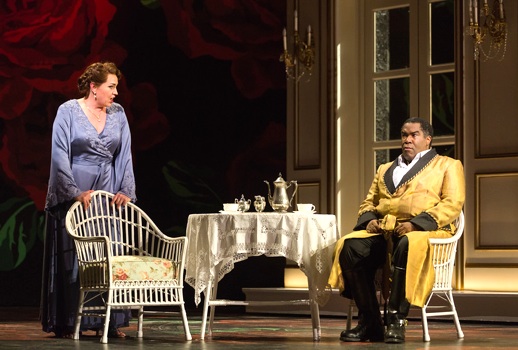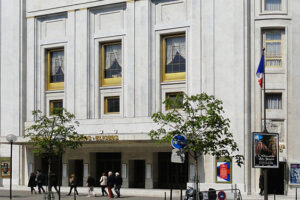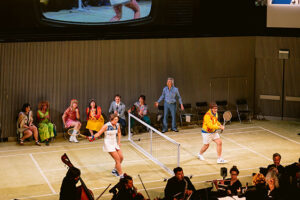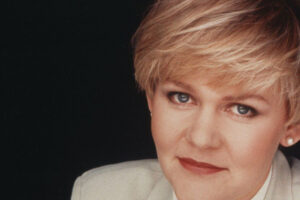

Here’s my experience of the first night of the Glimmerglass Verdi Macbeth.
Understood since pre-Freudian days as a superbly crafted musical masterpiece atmospherically charged and depicting, amongst other things, an insightful psychodrama of the Macbeths’ decline into madness against a background of supernatural interference, Verdi’s masterwork was at Glimmerglass reduced—by director Anne Bogart‘s battering us over the head with staging details of very little of relevance to the libretto or indeed musical or dramatic narrative—into a little domestic drama of soap opera proportions.
All I kept thinking throughout was… McDownton!
Here was a production that willfully strove to remove any element of atmosphere. The evening started with the overture, accompanied by the arrival via two aisles of lines of women in coats with handbags and suitcases whispering to one another, ignoring the libretto’s very exacting and painstaking instructions to delineate the three Shakespearean characters as three groups of witches. Eventually, they shaped into three groups when they got onstage to create a tableau of women chatting among themselves “in one” before a backdrop. Of atmosphere, character or menace there was nothing except some superb choral singing by the young artists involved.
So immediately one of the main characters (as stipulated by the composer and librettist) The Witches, was reduced to Roald Dahl-esque handbag ladies (so very like Adrian Noble at the Met!) Any real understanding of who they were was expunged from both sung text and supertitles as “le streghe” was sung as “le donne” and supertitled as “the women.”
A black cloth rose to the reveal the unit set, a black box with huge red roses (with green leaves). Setting aside the confusing notion that the rose is generally understood as a symbol of England instead of Scotland, the first impression was that we had stumbled into La traviata by mistake, perhaps a bus and truck version of the Met’s Willy Decker staging.
Inside this box set was a revolving wall of three French windows, the entire wall painted black on one side and white on the other. (Get it?)
The white side of the wall was adorned with electric light wall sconces, suggesting a drawing room or library a very grand country house. Now and then the scene was varied with pieces of white rattan garden furniture that might have wandered in from a The Importance of Being Earnest. At the start of Act 2, when the Macbeths appeared clad in Noel Coward-esque gilt dressing gowns, we might have landed instead in Lives!
The revolving wall cut the stage in half without being used on any interesting diagonal or angle, suggesting that the director was either stifled or overwhelmed by the set design. This lack, coupled with little ability to move the chorus effectively, stifled any coherent storytelling.
Entrances into the main acting area were afforded solely by “secret” and hideously noisy doors which—in combination with the shoes of the constantly scampering chorus—made so much noise that Verdi’s orchestra seemed to have sprouted a whole new percussion section.
Odd movement choices included running in place, walking backwards and the ever popular flinging oneself to the floor. Banquo’s murderers dispatched their prey with… baseball bats. Yes, in Cooperstown. Meanwhile, it occurred to no one to take his hat off when bowing to a King, or for that matter, out of respect to slain offspring when singing “Ah la paterna mano”
Lady read the letter in the presence of a gaggle of French maids, who thereafter busied themselves with hauling furniture and arranging themselves in artistic groupings, as, for example, during the sleepwalking scene where they dotted the stage holding candles. Ms. Moore ran, no, literally, ran around among them during this scene, while the Doctor, so far as I could tell, played his part for laughs. (At any rate, he won a number of guffaws from at least the section of the audience closest to me.) Having perhaps decided he had not stolen quite enough focus during the sung portion of the scene, the Doctor then drowned out the exquisitely musical coda by running offstage and slamming a door in the Wall of Roses behind him.
Eric Owens sang Macbeth in his role debut. Not a natural actor, he was hampered by a ham-fisted directorial interpretation, which made him weak from get-go. In the opening scene, he and Banquo were dressed über-smartly as Gestapo-esque soldiers. There was nary a sign of location, atmosphere or physical sign that these soldiers were on, or had been on, a blasted heath or had indeed returned from combat. No sign of exhaustion, no atmospheric lighting, just follow spots. They both sported oversized flashlights, which they shook or flicked on and off, which byplay seemed to scare both men and indeed Lady M at one point.
While we’re on the subject of lighting, if a production must, as this one did, use follow spots, is it asking too much for the operators to keep the light focused on the upper portion, particularly the face of a performer and keep up when said performer moves?
Whether one could see her face or not, Melody Moore sang the role well and powerfully. This is a real Lady in the making! For my taste she was made up to look a little too like Hyacinth Bucket, resulting in a certain lack of allure, and therefore weakening the connection between her and Macbeth. This was an ultra-feminist stand-and-deliver take on the character and work. Lady Macbeth was literally wearing the trousers! One didn’t find this Lady fascinating or scary—just vocally excellent, which wasn’t enough.
Owens sang well, but, having been misdirected, his character was always left appearing weak. Banquo, appearing at the French windows behind Macbeth in the banquet scene (and not at his seat or in his “place”) looked like a Shakespearean Peter Quint. The director had Macbeth climb on the table (several times), leaving Lady M quivering on her knees at the end the stage-spanning table, making for an odd and uninspiring stage picture.
In this scene, both the Macbeths were dressed in the most unflattering costumes. Lady M was garbed in a sleazy gold lamé sheath, and Owens in a tuxedo complete with a red ambassadorial sash, looking like it had been borrowed from Gremin in Eugene Onegin—topped off by a laughably oversized set of metallic epaulets that would have given Alexis Carrington an orgasm!
I appreciated the decision to re-instate the original 1847 ending and thus to have Macbeth die onstage with his short aria, “Mal per me che m’affidai.” However, it seemed unfair that Owens asked to perform this final solo lying on the sill of one of the wall’s French windows, and then having died, to be spun offstage when the wall revolved.
Joseph Colaneri’s conducting lacked the sense of musical architecture you’d expect from a festival’s music director. “Tutto e finito” almost slipped into waltz time. One highpoint of the evening was the choral singing. Their musical ensemble was tight and despite their small number, they made a big and musically precise sound.
Banquo (Solomon Howard), after some unsubtle singing, chose to take his curtain call as a zombie. Macduff (Michael Brandenburg) had a hat shading his face throughout his big aria, so whatever acting he might have done went for nothing. Happily, his big spinto tenor cut bracingly across the pit.
Malcolm (Marco D. Cammerota) offered an even beefier tenor, leaving this listener wanting to hear more of this young artist’s voice in roles of greater depth.
The Apparitions all acquitted themselves well despite the crazy “busy-ness” that surrounded their appearances.
Sorrowfully I must report that this production squandered the opportunity for Glimmerglass to present its first production of this great work. Despite the worthy vocal resources of the cast, this over-stylized production verged too many times on the risible to be taken seriously as a rendition of the masterwork that it purported to present.
Photo: Dory Schultz/The Glimmerglass Festival
























Comments